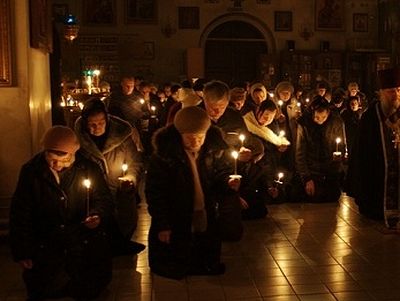Sixth Homily on the Lenten Season
Contained within the collection of homilies of St. Augustine of Hippo on the liturgical seasons is a series of seven “appropriately solemn” homilies offered at the beginning of the Lenten season in various years. In this series St. Augustine touches upon the classic Lenten themes of fasting, prayers, and almsgiving which enable us as Christians to enter upon the battle against the passions and for the virtues, such as humility and patience, which represent for us the taking up of our own crosses, and which we learn supremely from the Crucified Lord Himself. We offer here one of these sermons each day for the first week of Great Lent:
These holy days which we are devoting to the observance of Lent remind me to speak to you about fraternal agreement, so that whoever has a complaint against another may bring it to an end lest he himself come to an end. Do not despise these words, my brethren. For, by reason of the fact that this mortal and frail life, which is passed amid so many earthly temptations and which prays that it may not be overwhelmed by them, cannot be lived even by a just person without some sins, we have a remedy by which we can live because our Teacher, God, taught us to say in His prayer: Forgive us our debts, as we also forgive our debtors.1 We have done what was stipulated and what was pleasing in the eyes of God, and we have signed the agreement for cancelling our debt. If we ourselves forgive, we seek to be forgiven with the utmost confidence; but if we do not forgive, let us not think that our sins are forgiven; let us not deceive ourselves. Let man not deceive himself; God deceives no man. It is human to get angry: would that we did not have this power! It is human to get angry; but your anger ought not, like a tender young twig, to be watered by suspicions and finally to grow into a tree of hatred. For anger is one thing; hatred, another. Assuredly, a father often becomes angry at his son, but he does not hate him; he becomes angry in order to correct him. If he is angry for the purpose of correction, he is angry while he continues to love. For that reason it has been said: Thou dost see the speck in thy brother’s eye, but dost not consider the beam in thy own eye.2 You censure anger in another, and you nourish hatred in yourself. In comparison with hatred, anger is a mere twig; but, if you cultivate a twig, it will become a tree; if you uproot it and cast it out, it will amount to nothing.
If you were attentive when the Epistle of St. John was read, you should have been terrified by his words, for he says: The darkness has passed and the true light is now shining. Then, continuing, he adds: He who says that he is in the light, and hates his brother, is in the darkness still.3 But perhaps man may think that the darkness is like that suffered by those who are shut up in prisons. Would that it were so! Nevertheless, no one wishes to be in such darkness. Innocent people, however, can be confined in the darkness of prisons. In fact, the martyrs were so imprisoned; darkness engulfed them on all sides but light shone in their hearts. In that gloom of the prison they saw God, not with the eyes of the body, but in the love of the brethren. Do you wish to know the nature of that darkness of which the Scriptures say: He who hates his brother is in the darkness still? St. John also says in another place: He who hates his brother is a murderer.4 He who hates his brother walks about, leaves and enters the house, goes on his way burdened with no fetters, shut up in no prison, yet bound by his guilt. Do not consider that he is without confinement. His heart is his prison. Lest by chance you should contemn such darkness when you hear: He who hates his brother is in the darkness still, St. John says in addition: He who hates his brother is a murderer. Do you hate your brother and walk about free from care? Are you unwilling to be reconciled, although God is giving you an opportunity for that purpose? Behold, you are a murderer and yet you live. If you had an angry Master, you would be taken off suddenly in the midst of your hatred of your brother. God is sparing you; spare yourself; make peace with your brother. But, perhaps, though you wish to do so, he is unwilling. Let that suffice so far as you are concerned. You now have cause for grievance, for you have done your part. If you wish to be reconciled and he is unwilling, say in all security: Forgive us our debts, as we also forgive our debtors.
Perhaps you have sinned against your brother; you wish to make peace with him; you wish to say to him: “My brother, forgive me for having sinned against you.” But he is unwilling to forgive; he does not wish to discharge your debt; he is reluctant to cancel what you owe him. Let him take heed inasmuch as he, too, has to pray. When he shall come, who has been unwilling to forgive you for having sinned against him, when he shall come to pray, what is he going to do? Let him say: Our Father who art in heaven. Let him speak thus and add: Hallowed be thy name. In addition to this say: Thy kingdom come. And continue with: Thy will be done on earth, as it is in heaven. Then proceed with: Give us this day our daily bread.5 You have said this much; now see if, perchance, you wish to omit what follows and substitute something else. There is no way by which you can pass; you are held in this spot. Speak, then, and speak the truth, or if you have no cause for saying: Forgive us our debts, do not say it. Yet, where is [your recollection of] that other statement which the same Apostle made: If we say that we have no sin, we deceive ourselves, and the truth is not in us?6 But if the consciousness of our frailty stings us, and, indeed, in this world there is an abundance of iniquity, then say: Forgive us our debts. But, consider what follows, for you have been unwilling to forgive your brother’s sin and you are about to say: as we also forgive our debtors. Or are you not going to say it? If you are not going to say the words, you will receive nothing; but if you are going to say them, you will speak falsely. Therefore, speak and speak the truth. How are you going to speak the truth, if you have been unwilling to forgive the sin of your brother?
I have admonished him; now I console you, whoever you are, if only you are one who has said to your brother: “Forgive me for having sinned against you.” If you have spoken with your whole heart, with a true humility and unfeigned charity, which God sees in the heart whence your words have come, and if your brother has continued to refuse to forgive you, do not be concerned. You are both servants and you have the same Master; you are indebted to your fellow servant, but he is unwilling to forgive you; importune your Master. What the Lord has pardoned let a servant exact, if he can. Furthermore, I say this: I advised him who was unwilling to forgive his brother to do what he was reluctant to do when his brother sought to be forgiven, lest when he himself prays he may not obtain what he desires. I also advised him who sought pardon for his sins from his brother and did not obtain it to be confident of obtaining from the Lord what he failed to get from his brother. There is another word of advice which I would give when your brother has sinned against you and has been unwilling to say to you: “Forgive me for having sinned against you.” Such words are plentiful.7 Would that God would root them out of His land, that is, out of your hearts! How many there are who know that they have sinned against their brethren and yet are unwilling to say: “Forgive me.” They were not ashamed to commit sin, but they are ashamed to beg pardon; they did not blush when there was question of iniquity, but they do blush where humility is concerned.
Above all, therefore, do I admonish those of you who are at variance with the brethren. You are summoning yourselves before your own tribunal; you are examining yourselves; you are bringing a just judgment against yourselves within your own hearts; and you are discovering that you ought not to have done what you have done, that you ought not to have said what you have said. Seek pardon, then, as brethren from brethren. Do for your brethren what the Apostle advises: Generously forgiving one another, as also God in Christ has forgiven you.8 Do this, and do not be ashamed to seek pardon. In the same manner I speak to all, men and women, young and old, lay persons and clerics, and to myself, also. Let us all hearken; let us all fear. If we have sinned against our brethren, if up to this time we have been granted a truce for further living, we are not dying as a result of our sin. In fact we are still living; we have not yet been condemned. Then, while we are alive, let us do what is ordered by our Father who will be our Judge; let us seek pardon from our brethren whom we have offended and, perhaps, wounded by sinning against them.
There are some persons who, though they are lowly in the rating of this world, yet are lifted up in pride if one seeks pardon of them. This is what I advise in such a case. Sometimes a master sins against a servant. Even though he is the master and the other a servant, both are servants of another Master because both have been redeemed by the blood of Christ. Yet it seems hard that I should order and command that, if a master sins against his servant by unjustly quarreling or by unjustly striking him, the master should say: “Forgive me; pardon me.” This seems hard, not because he ought not to do it, but because [the master fears] that the servant may become unbearably haughty. What then? Before the eyes of God let the master repent; before the eyes of God let him punish himself; and if he cannot say: “Forgive me” to a servant because it is not fitting, let him address that servant graciously, for to accost one graciously is to ask for pardon.
It remains now for me to address those against whom others have sinned and from whom the offenders have been unwilling to seek pardon. I have already spoken to those who were unwilling to forgive offenders who sought pardon. Now, then, since I address you all and since these are holy days, do not let your enmities remain. I suppose that some of you, who know that you have some differences with your brethren, have thought the matter over in your hearts and have found that, instead of your having sinned against them, they have sinned against you. Even though you do not say this to me now, because in this place it is my privilege to speak and yours to listen in silence, still, perhaps while thinking, you speak to yourselves and say: “I wish to make peace, but he has injured me; he has sinned against me; and he does not wish to ask pardon.” What then? Am I going to say: “Go to him and beg pardon of him”? Not at all. I do not wish you to lie. I do not want you who know that you have not sinned against your brother to say: “Pardon me.” For how does it profit you to be your own prosecutor? Why would you seek pardon from him whom you have not offended or against whom you have not sinned? That is of no use to you, I do not wish you to do it. You understand; you have examined the matter well; you know that he sinned against you, not you against him. “I know,” he says.9 Let your conscience rest in that definite knowledge. Do not go to your brother who has sinned against you and voluntarily ask pardon of him. There ought to be other peacemakers between you to exhort him earnestly to seek forgiveness from you; do you merely be ready to forgive him, ready to pardon him completely from your heart. If you are ready to forgive, you have already forgiven. You still have something to pray for; pray for him, that he may seek pardon from you. Because you realize that it is harmful for him if he does not seek forgiveness, pray for him that he may do so. Say to the Lord in your prayer: “Lord, You know that I have not sinned against my brother and that he has sinned against me. You know, too, that his having sinned against me is harmful for him if he does not seek pardon from me. With a good intention, then, I beg You to pardon him.”
Behold, I have told you that especially during these days of your fasts, of your pious practices, of your continency you ought to cooperate with me so as to make peace with your brethren. May I, who am saddened by your strife, rejoice in your peace, so that, forgiving one another if anyone has a complaint against another, we may in peace celebrate the Pasch and in peace observe the Passion of Him who, owing nothing to anyone, paid the price for those who were in debt. I refer to our Lord, Jesus Christ, who sinned against no man and against whom almost the entire world sinned. Yet He demanded no punishments but promised rewards. Therefore, we have Him as witness in our hearts that, if we have sinned against anyone, we are seeking pardon with sincere hearts and that, if anyone has sinned against us, we are prepared to give pardon and that we are praying for our enemies. Let us not expect to be avenged, my brethren. What does vengeance mean except to be delighted by another’s misfortune? I know that each day men come, bend their knees, touch the earth with their foreheads, sometimes moisten their faces with tears, and in all this great humility and distress say: “Lord, avenge me. Kill my enemy.” Certainly pray that the Lord may kill your enemy, but also pray that He may spare your brother. Let God destroy hostilities, but let Him save your brother’s life. Pray that God may avenge you; let him who persecuted you perish; but let him remain who is restored to you.
From The Fathers of the Church vol. 38: St. Augustine: Sermons on the Liturgical Seasons, (New York: Fathers of the Church, Inc.), 1959, pp. 108-115







